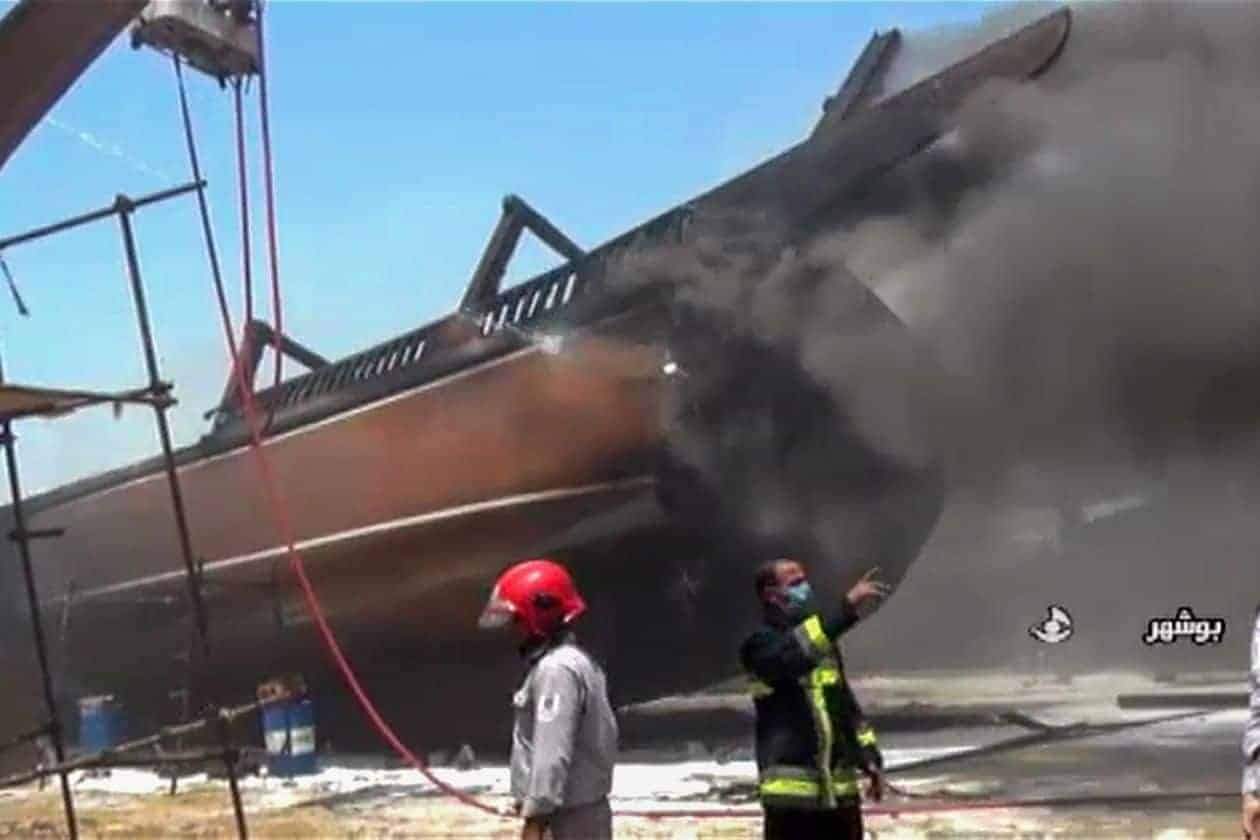Blaze at Iranian Port Adds to String of Damaging Incidents

Iranian authorities are investigating a blaze that damaged seven ships at a southern Iranian port, the latest in a string of fires and explosions that have raised suspicions of coordinated sabotage targeting the nation’s infrastructure and a nuclear facility.
Iranian state television showed black plumes of smoke billowing over the Bushehr port on Wednesday as firetrucks worked to extinguish the flames. A shipping-services provider operating at the port confirmed that at least seven vessels had caught fire. Authorities said they didn’t know the cause of the fire. No casualties were reported.
Jahangir Dehghani, director general of local crisis management in Bushehr, told state television that a cause would be disclosed once authorities concluded their investigation.
The fire at Bushehr’s Delvar Shipyard follows a series of incidents that have damaged facilities connected to Iran’s nuclear and missile programs and other important infrastructure. Bushehr, which lies on the Persian Gulf coast, is a key hub for Iran’s oil industry and home to the Bushehr Nuclear Power Plant.
Iranian officials have characterized most of the recent incidents—which number at least eight in less than three weeks—as accidents. The government hasn’t given a cause for the most serious incident, a massive explosion July 2 at Natanz, one of the country’s key nuclear facilities.
The blast at Natanz dealt extensive damage to an assembly center for advanced centrifuges, destroying most of the roof and nearly the entire building. Arms experts say the damage, visible on satellite imagery, bears signs of explosives planted inside the building.
A previously unknown group calling itself the Homeland Cheetahs, which said it consisted of members of Iran’s security forces intent on bringing down the Islamic Republic, claimed responsibility for the explosion at Natanz. Analysts have linked the incident to sabotage by foreign powers, most likely Israel. Iranian officials have privately said they suspect Israel was behind the blast, according to Iranian and European officials.
After Israel accused Iran of trying in April to disrupt its water supply with a cyberattack, Israel targeted the command-and-control system at an Iranian port in Bandar Abbas, according to a foreign security official with knowledge of the Israeli operation. That resulted in dozens of cargo ships congesting the harbor.
Israel declined to comment on Wednesday and hasn’t commented on the Natanz incident.
Other recent incidents include a fire at a hospital in Tehran, which killed 19 people, and an explosion at the Khojir missile base east of the capital. Authorities said both incidents were accidents.
Tensions have surged in recent weeks between Tehran and its rivals ahead of the October expiration of a United Nations arms embargo imposed on Iran, which the U.S. and Israel have strongly called to extend.
Hostilities between the U.S. and Iran have subsided slightly since the U.S. killing in January of Iranian Maj. Gen Qassem Soleimani with a drone strike in Iraq. Iran later fired a barrage of missiles at a base in Iraq housing U.S. troops, causing concussions from the blasts among troops there, according to the Pentagon.
Most recently, Iranian officials have gloated about the fire on the American amphibious assault ship USS Bonhomme off the coast of San Diego.
“Americans shouldn’t look for someone to blame and accuse others. This is a fire they set themselves,” the commander of the Revolutionary Guard’s Quds Force Esmail Ghaani said Wednesday. “This incident is the response of your atrocities and has been done by your own elements. God punishes you with your own hand.”
Adding to tensions in the region, a Dominican-flagged tanker was hijacked and then brought to Iran earlier this month, according to U.K.-based nonprofit seafarers organization Human Rights at Sea, who cited the vessel’s captain. Iranian businessmen had tried to buy the ship in May but were foiled when their accounts were frozen by the U.S., according to a U.S. court case.
Photo: At least seven vessels caught fire at the Bushehr port on Wednesday. Smoke billowed from a ship in this image taken from Iranian State television. - PHOTO: IRIB NEWS AGENCY/AGENCE FRANCE-PRESSE/GETTY IMAGES











